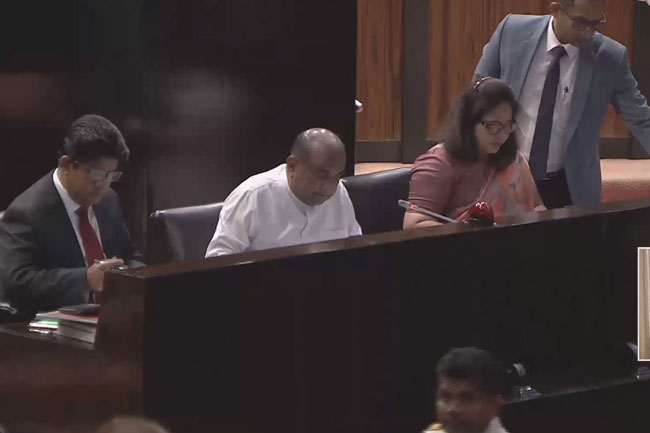Second Reading of Online Safety Bill passed in Parliament
January 24, 2024 05:19 pm
The Second Reading of the Online Safety Bill was passed in Parliament today (Jan. 24) with a majority of 46 votes.
A total of 108 MPs had voted in favour, while 62 had voted against the Bill.
The Sectoral Oversight Committee on Media, Youth, Heritage and New Citizen recently approved the Online Safety Bill, subject to the amendments determined by the Supreme Court.
The bill was approved when the Sectoral Oversight Committee met in Parliament on Monday (22) under the chairmanship of the MP Lalith Warankumara. Thus, the bill, which was tabled in Parliament by Minister of Public Security Tiran Alles was taken for the second reading debate on Tuesday (23) and Wednesday (24).
The Online Safety Bill, published in the government gazette on September 18, aims to ban online communication of certain statements in the country, prevent the use of online accounts – both authentic and inauthentic – for the use of prohibited purposes, to suppress the financing and other support of communication of false statements and other related matters.
However, the Bill has come under fire for some of its problematic aspects, with the Asia Internet Coalition (AIC) which consists of multiple tech giants including Apple, Facebook, Google, Amazon, and Yahoo, the International Commission of Jurists (ICJ), the Bar Association of Sri Lanka (BASL), and the Human Rights Commission of Sri Lanka (HRCSL) voicing concerns.
A total of 45 petitions had been put forward by Cardinal Malcolm Ranjith, Samagi Jana Balawegaya (SJB), National People’s Power (NPP), journalist Tharindu Uduwaragedara and many other parties, alleging that the relevant bill is in violation of the fundamental rights of freedom of speech and expression guaranteed by the Constitution.
Later, the Supreme Court, after concluding the deliberation of petitions, communicated its determination on the constitutionality of the Bill and its provisions to President Ranil Wickremesinghe and Speaker of Parliament, emphasizing that pursuant to Article 84(2) of the Constitution, Clauses 3, 5, 7, 9, 11,12, 13, 14, 15, 16, 17, 18, 19, 20, 21, 22, 23, 25, 26, 27, 28, 29, 30, 31, 32, 36, 37, 42, 45, 53, and 56 should be passed by a special majority in the parliament.
However, if these clauses are amended during the Committee Stage, the Online Safety Bill can be passed by a simple majority in the parliament, the Supreme Court’s determination further stated.














